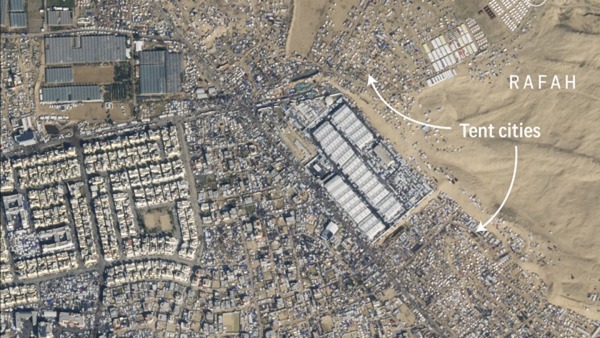Israel’s military says it has begun ordering Palestinians to leave parts of eastern Rafah ahead of a “limited” operation in the southern Gaza city.
About 100,000 people are being directed to head to an “expanded humanitarian area” in Khan Younis and al-Mawasi.
After seven months of war, Israel says it must take Rafah to defeat Hamas.
But the UN and US warn that an assault on the city, where more than a million displaced Palestinians are sheltering, could have catastrophic consequences.
A senior Hamas official called the evacuation order a “dangerous escalation”.
Israeli air strikes in Rafah reportedly killed at least 19 Palestinians overnight, after rockets launched from the area by Hamas fighters killed four Israeli soldiers at the nearby Kerem Shalom border crossing – the key entry point for humanitarian aid into Gaza.
The attacks came as the latest efforts for a new ceasefire and hostage release deal stalled, although mediators said they were continuing their efforts.
In an initial briefing to journalists on Monday morning, Israel Defense Forces (IDF) spokesman Lt Col Nadav Shoshani stressed that the operation planned in Rafah was of “limited scope”.
He said that no time frame had been announced and that the evacuation affecting an estimated 100,000 people would be carried out in “a gradual way”.
The IDF is using text messages, flyers and social media to tell people to move.
One of the Arabic flyers dropped by aircraft features a map that identifies nine area blocks in south-eastern Rafah where the IDF says it will “be operating against the terrorist organisations”. They include al-Shuka, al-Salam, al-Janina and al-Yarmouk, as well as farmland near Kerem Shalom.
The flyer instructs residents of those areas to evacuate immediately and head towards an area stretching north along the Mediterranean coast from al-Mawasi – a thin strip of agricultural land that has long been an IDF-designated “humanitarian zone” – to Khan Younis and the central town of Deir al-Balah.
The IDF said the expanded humanitarian area included “field hospitals, tents and increased amounts of food, water, medication and additional supplies”.
Such messages are unlikely to allay the fears of locals and more than a million displaced Palestinians crammed into Gaza’s southernmost city that a wider offensive is on the cards.
For months, Israel’s Prime Minister Benjamin Netanyahu has been insisting that victory against Hamas cannot be won without a full-scale offensive there.
Israel says Rafah harbours four remaining Hamas battalions – amounting to thousands of fighters.
Israeli forces invaded Gaza three weeks after Hamas fighters stormed into southern Israel on 7 October, killing about 1,200 people and seizing more than 250 hostages, according to Israeli tallies.
More than 32,490 people have been killed in Gaza since the start of the war, according to the territory’s Hamas-run health ministry.
Western and Arab powers, as well as the UN, have repeatedly warned against a wide ground operation in Rafah, because of the prospect of high numbers of civilian casualties.
Officials from Israel and its closest ally, the US, have been holding meetings to discuss alternative, more focused plans. It is not clear if the new evacuation orders are part of those.
Ghada el-Kurd, a Palestinian mother-of-two who has been displaced six times over the last four months, told the BBC that she was sheltering only 15 minutes away from one of the affected areas but was staying part for now.
In response to the IDF’s announcement, the UN agency for Palestinian refugees, UNRWA, which runs the largest humanitarian organisation in Gaza, said the “consequences would be devastating for 1.4 million people”.
James Elder, a spokesman for the UN children’s agency, Unicef, who was in Gaza last month, said families now had no choice but to head towards areas that were already overcrowded and lacked basic facilities.
Hamas official Sami Abu Zuhri told Reuters news agency: “This is a dangerous escalation that will have consequences. The US administration, alongside the occupation, bears responsibility for this terrorism.”
Overnight, Israeli Defence Minister Yoav Gallant told US Defence Secretary Lloyd Austin in a telephone call that “military action is required, including in the area of Rafah”, citing Hamas’s attack on Kerem Shalom and its stance at the ceasefire negotiations in Cairo.
The US defence department said Mr Austin “reaffirmed his commitment to the unconditional return of all hostages and stressed the need for any potential Israeli military operation in Rafah to include a credible plan to evacuate Palestinian civilians and maintain the flow of humanitarian aid”.
In Israel, some families of hostages expressed their fear about what a Rafah operation might mean for their loved ones.
A deal agreed in November saw Hamas release 105 hostages in return for a week-long ceasefire and some 240 Palestinian prisoners in Israeli jails.
Israel says 128 hostages remain unaccounted for in Gaza, at least 34 of whom are presumed dead.





